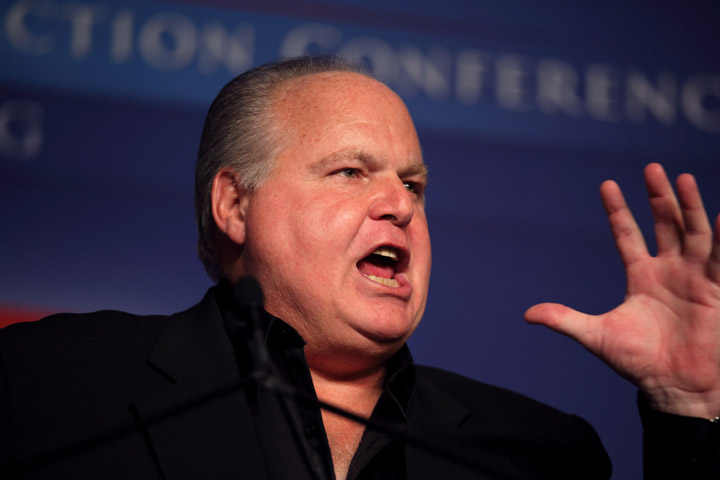When it comes to politics, ignorance really is bliss. I didn’t really know very much at all about politics until I felt obligated by civic duty to start paying attention around 2006. One of the things that I chose to do was expose myself to different voices, so I started listening to conservative radio (starting with Rush Limbaugh) as well as looking for liberal radio (which was harder to find, but I found some). It definitely degraded the happiness level of my life, but I learned a lot. I learned, for example, that the mainstream media frequently misquotes Rush Limbaugh and that, for his part, Rush Limbaugh frequently says misquotable things. It’s a co-dependency: each relying on the perceived injustice of the other to rally their own side (and drive advertising dollars, of course).

I also learned that when Rush Limbaugh has to pick between his principles and his ratings, he picks his ratings every time. The most vivid demonstration of this comes every four years during the GOP primary when Rush–who could probably have an impact if he wanted to and claims to know all the answers–studiously refuses to take sides while pretending to be on everyone’s side. This was particularly prominent in 2008 when he created “Operation Chaos.” The idea was to try and get his listeners, in states where this was legal, to go and vote for Hillary Clinton in the Democratic primaries to keep her campaign against Barack Obama alive. Obviously this was morally dubious at best, but it was a perfect PR stunt for Rush because he couldn’t lose. At the time the two campaigns were close, so he could take credit for that, but when one invariably one over the other that wouldn’t be his fault. It would be inevitability. And, of course, he didn’t risk angering any viewers. But if he weighed in on the GOP primary, he could actually risk alienating viewers or–worse!–backing a loser. So he had a bunch of vacuous platitudes that made every ignorant caller feel like he was on their side, but he basically said nothing. Contrast Ann Coulter, by the way, who surprised me by coming out early for Mitt Romney in 2012 and sticking with him the entire time. I have grudging respect for her because of that, although it’s probably while she’ll never be as big as Rush. He’s a consummate entertainer, and the important thing is to keep that in mind when considering his political “arguments”.
My conclusion, by the way, is that Rush doesn’t really give a damn about conservative principles. I’m not saying this will surprise anyone, but it’s a good example of my first point: if you care about something you will take risks for it. Rush doesn’t take risks for conservatism despite opportunities to do so. Conclusion: he doesn’t care.
Then there’s the other end of the spectrum: folks who (judging by the words) care about an issue a lot. So much so that we might call them extremists. The problem there is clearly a super-abundance of caring, right? Well not so fast. The reality is that any ideologue who puts principle ahead of pragmatism is neither principled nor pragmatic. A true idealist must be a pragmatist. If they are not seriously engaged in finding out how to implement their ideals, then how can we really say they genuinely care about those ideals? Meanwhile, a pragmatist must by definition be an idealist because pragmatism requires some values (i.e. ideals) in order to work. Without ideals a pragmatist would have no way of deciding what is pragmatic. Thus: idealists who eschew pragmatism are hypocrites and pragmatists who despise idealism are delusional. (So much for the contrast between deontology and consequentialism in ethics!)
So when I hear someone taking an extreme tack in a debate, my first response is not “They must really care about this issue”, but rather “They must be really self-absorbed.” Inflammatory rhetoric is, more than anything else, a cry for attention. Attention to the speaker. It’s not good at drawing attention to the issue because first of all: it draws angry responses rather than thoughtful ones and secondly: it provides easy excuses for anyone writing a response to ignore good points you might make.

One example of this is the pro-life schism that I wrote about yesterday, but the example that actually got me thinking about this earlier in the week comes from an exchange between John Scalzi and Michael Z. Williamson. A while back Scalzi wrote a now-famous piece in which he compared being a white, heterosexual, Christian male in the United States to playing a video game on the easiest difficulty setting. It was his way of describing male privilege to gamers, and it was widely popular with the sort of people who think male privilege is a vitally important issue. Me? I have deep misgivings, but they are subtle and I haven’t fully formed them yet. Hence: no response on my part. In addition, I will add that while I think Scalzi has a tendency to play to his audience (what author doesn’t?), in male privilege he has found an issue that satisfies a craving to be well-thought of and to do genuine good.
As you can imagine, Scalzi’s piece was controversial. One of the best responses I’ve read came from another sci-fi author: Michael Z. Williamson. Williamson made at least two points that I thought were really strong. First, he pointed out that “an actual racist” would have no problem with Scalzi’s assertion. If being a white male makes life easier, it’s because white males are the best, right? This is what racism has historically been all about: the belief that your race is superior. As Williamson put it:
An actual racist (I’ve met a few) would say, “Well, yes, I’ve done well, because I’m genetically and intellectually better than those lesser races.” They would have no reason to get upset with his post, because it would tell them exactly what they wanted to hear: That they’re at the top of the heap, awesome.
The fact that virtually no one (that I know of ) reacted this way illustrates that there’s a problem with the underlying assertion that racism is the explanation for white privilege. At a minimum, this is a challenge to Scalzi to more carefully articulate why white privilege works the way he alleges it does, since the most simple assertion (good ole-fashioned bigotry) is incompatible with the response that his piece actually earned.
Second, he pointed out that Scalzi is not such a big supporter of racial and gender equality as he might like to think he is:
In fact, even a BLACK liberal writer made several critiques of his position, starting with Scalzi’s own self-described “passive-aggressive” approach to never identifying characters’ race, so people can “assume” whatever they want, which means, of course, the whites generally assume the characters are white, and in a white-dominated nation, those of other ethnicities do too, because that’s the default setting in contemporary America that he mentioned. In other words, he’s not actually doing anything about the problem except whining.

In other words, Williamson is arguing that Scalzi isn’t taking any risks. Therefore, by the same logic that applies to Rush Limbaugh, he doesn’t seem to genuinely care about this issue. This is an even more trenchant observation than the first, and I would have loved to have seen Scalzi’s reply. But of course, I never will. Not to these points, anyway. Why? Because Williamson peppered his argument with so many convenient excuses not to engage in his good points. First, he made the dumb allegation that by moderating posts on his own blog, Scalzi was censoring the discussion, referring to Scalzi’s “his tendency to “carefully manage” blog comments (newspeak for “censor dissenting opinions”).” Williamson didn’t actually allege that the conduct was illegal (thus completely missing the point of the First Amendment), but it was close enough to give Scalzi an easy target. Which he tore into with glee on Twitter.
Secondly, Williamson’s repeated use of partisan language (e.g. “someone did suggest that the purpose of [Scalzi’s] posts is more to promote his books in the guilt-ridden, white, racist, liberal sellout market than to actually accomplish debate”) gave Scalzi another big, fat target. So, when he did respond on his blog, it was entirely to that assertion. The solid points that Williamson made? May as well never have made them.
Now I’m not saying that Williamson could force Scalzi to deal with the hard questions, but he could at least have made him work for his evasions. And I also don’t meant to make Williamson into a hero here (even an incompetent one), because his blanket assertions that Scalzi operates out of craven white-guilt clearly repudiate his own alleged concern for “debate”. What I am saying is that here we have two very prominent voices discussing an issue that I think really matters deeply, and their careless speech allows it to quickly deteriorate into childish taunting.
Speaking carefully doesn’t attract a lot of attention. It doesn’t fill that need in people’s guts to have someone validate their beliefs. It doesn’t scratch that psychological itch for a sense of in-group superiority. It doesn’t draw the ire of your partisan rivals and, therefore, boost your visibility and sense of importance. It’s pretty thankless work, actually. But it’s what people who really care tend to do. They say things that might be risky, but they say them with deliberation and with care. It’s harder to find these voices, but it’s worth the effort.